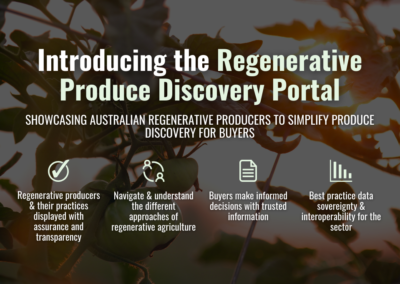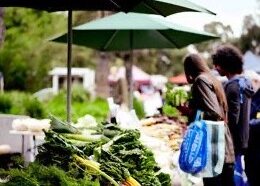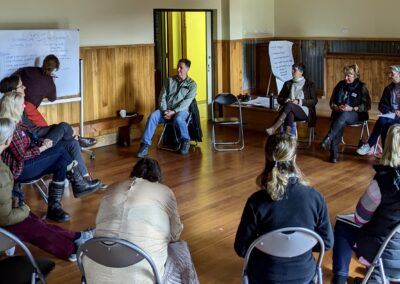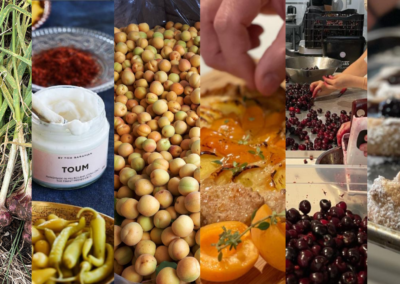Case Study
Farm Foodstore
Background
Kellie, the founder of Farm Foodstore, was raised on a sheep and grain property in North Eastern Victoria and has built a career in the community development and education sectors. Her passion for agriculture and education have been interwoven into the unique Farm Foodstore hub model. This model sees locally produced fresh produce boxes being delivered to customers on a weekly basis, via school drop off points. By fostering links between local farmers and families in the community through schools, Kellie is able to achieve the two primary objectives of the hub. Firstly, supporting local farmers to get a fair price for their produce. And secondly, raising the accessibility of fresh, healthy produce into the community, while also educating young families about food production and healthy eating.
Partnerships with other organisations are integral to the Farm Foodstore model. Upstream in the supply chain Farm Foodstore has partnered with the South East Food Hub. This large hub aggregates produce from local farmers and distributes to the Farm Foodstore, who then deliver the produce to families via school drop off points. Partnering with the South East Food Hub allows Farm Foodstore to tap into their well established network of high quality local producers and take advantage of efficiencies of scale. Similarly, partnering with local schools also allows the hub to not only access customers but to also bring value to the school in the form of experiential learning through kitchen garden programs and farm excursions, which Kellie contributes to in addition to the veggie box scheme.
Getting started – Challenges and resources
Commencing Farm Foodstore was an iterative and gradual process. The key tasks in the early stages were to identify suitable hub locations within local schools and work with school principals to ensure the partnership would be a good fit. Kellie was able to draw upon her existing professional networks within schools to fast track this process. Crucial marketing components such as constructing the website, designing and distributing promotional flyers and designing and executing the social media strategy also required a large amount of time and focus. In under twelve months of operating the hub is delivering over 50 orders each month.
Operational Model
Suppliers and Products
Farm Foodstore sources most fresh products from The South East Food Hub (SEFH). This large hub sources and aggregates produce from local farmers, which is then distributed to end customers via numerous other hubs (and buying groups), one of which is Farm Foodstore. The SEFH source produce from dozens of farmers in the East Gippsland region, within the constraints of local seasonal availability at the farm level. These products, encompassing fruits, vegetables, dairy, preserves and bread are then available to Farm Foodstore.
On a weekly basis, Kellie opens her Open Food Network shopfront which is stocked with products available at the SEFH that week. When orders close, Kellie’s customer’s orders are visible to the SEFH, who then arrange with farmers to have this produce delivered to the SEFH packing shed. Each week Kellie collects her customers’ pre-packed produce boxes and delivers them to the pick-up points. Kellie operates same day delivery, to avoid the need for storage or refrigeration facilities. She also does deliveries to other hubs and buying groups who order through the SEFH for a fee, which allows her to make efficient use of her van.
In addition to fresh produce sourced through the SEFH, Farm Foodstore also sources dry goods and pantry items for sale in their once monthly online dry goods store. Customers can add items such as flour, tea and nuts to their vegetable order. The hub also sells baked goods on behalf of a local disability support service, to raise funds for their programs.
Customers
Being embedded in a local primary school setting, young families are the logical target customers for Farm Foodstore. On a monthly basis the hub caters to approximately 35 families, within two local primary schools, via weekly deliveries. By offering order collection at school pick-up time convenience is a selling point of the hub, as well as the freshness of the produce, which is commonly remarked upon by customers. Many customers are also attracted to the fundraising element of the hub, whereby a percentage of proceeds are donated to the school’s food education programs. One such program is the “Plot to Pot” kitchen garden program at Menzies Creek Primary School which teaches students about healthy eating through experiential learning in the garden. As revealed by the feedback Kellie receives from customers, these are two of the primary reasons why her returning customers continue to shop at the hub, in addition to their desire to be a part of the broader food hub movement, which they see as holding strong merit.
However, despite these sound draw cards, there are a number of barriers which can prevent customers from ordering regularly through the hub. Changing shopping habits, from frequent visits to the one-stop supermarkets to establishing a new routine of ordering online with the Farm Foodstore’s has proven a challenge. Similarly, the restricted seasonal availability of produce can also require a change in thinking and eating patterns from customers. Kellie has initiated a number of strategies to overcome this including reminder emails, text messages and seasonal recipe ideas, but appreciates that engrained shopping and eating habits take time to change.
Partnerships
Farm Foodstore works in partnership with a number of external organisations, which brings mutual benefits to each party. As mentioned, Farm Foodstore is part of a wide network of hubs in the South East of Melbourne who source produce through the South East Food Hub. The nature of the SEFH’s model is that ‘sub-hubs’ such as Farm Foodstore can easily branch out from the SEFH, taking advantage of their supply agreements with local producers and their aggregation and packing facilities. By sourcing produce through this hub, Kellie was able to fast-track the process of setting up a network of suppliers and configuring the incoming logistics. Kellie has also found that the SEFH partnership has yielded invaluable general business support and the opportunity to learn from people who also operating in the food hub space and confronting the unique challenges of running a community food enterprise.
The partnerships formed with local primary schools have also granted Farm Foodstore the ability to insert the food hub model within an educational setting. This not only provides the hub with a delivery location and platform for promoting the business, but also the potential to further enrich the hub’s educational efforts through in-school activities. In return, the schools are able to benefit from Kellie’s thorough understanding of food system curricula and her insights and connections within the farming community.
Staff
Kellie manages the day-to-day operations of the food hub, but is also lucky to receive a helping hand from her friends and family who assist with her accounts, social media and design tasks when needed.
How the Open Food Network is used
Farm Foodstore uses the Open Food Network to host both the online weekly veggie box orders and the monthly dry goods orders. The Farm Foodstore weekly veggie box shopfront is linked with the SEFH’s system within the Open Food Network. This linkage allows Kellie to quickly ascertain what’s available at the SEFH in the coming week, and to populate her Farm Foodstore shopfront. Similarly, when her order cycle closes, all of her orders are immediately visible to the SEFH, who can then go about sourcing the required produce from their network of farmers. This communication with the supplier through the Open Food Network, makes the procurement process straightforward. Kellie’s favourite features of the site are its price transparency and the capacity to see the farmer’s profile linked to their products. She’s also sees deep alignment between the values underpinning her business and those underpinning the Open Food Network which is why Kellie is pleased to support the growth of the Open Food Network through the participation of Farm Foodstore.
The future
For Kellie, one of the most satisfying things to have come from the venture has been creating a model which can be used to not only make fresh produce accessible to the community, but to also use it as a way of communicating the value of healthy, local and ethically sourced food. She’s been thrilled to witness conversations taking place in her community and questions being asked relating to the food system that have been sparked by the Farm Foodstore. Kellie would ideally love to see a food hub operating in every suburb and town across the country.
In the coming months, the hub will continue to work towards refining the hub’s operations to create a hub model which is financially sustainable, flexible and responsive. An important objective for Kellie is to create model which can be easily replicated in a variety of educational settings. On the horizon the hub has plans to facilitate a kitchen education program in the local primary school, involving cooking classes and learning about farming and food production, complimented with excursions to farms. Kellie hopes to also offer these activities and learning opportunities to the community more broadly.
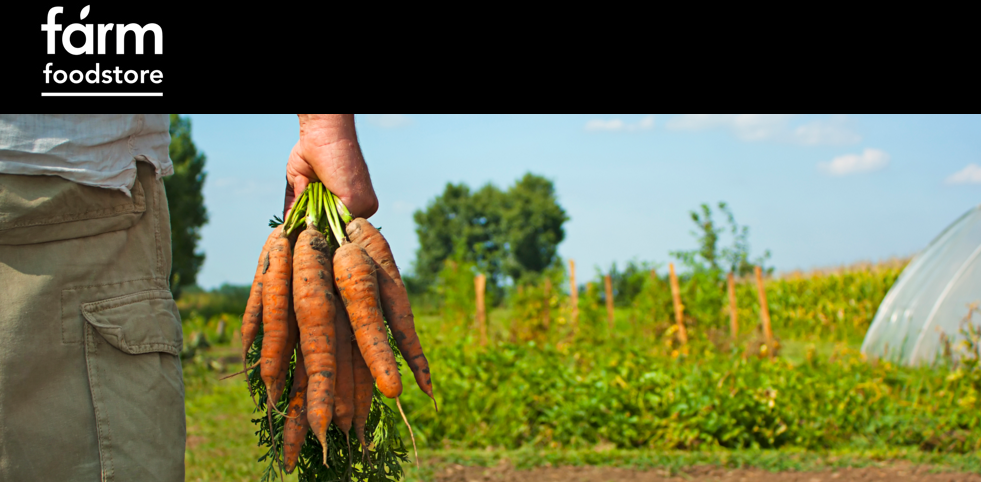
Latest Resources
Can we help?
Have an idea, a project or a question? Want help using the Open Food Network software? Get in touch and find out how we can help you with it.
Keep in touch
Join us
Create a listing, shop or group directory on the Open Food Network. Tell me more!
Read our Terms and conditions | Find us on GitHub
Open Food Network is a free and open source software platform. Our content is licensed with CC BY-SA 3.0 and our code with AGPL 3.
We take good care of your data. See our cookies policy
Open Food Network respectfully acknowledges the traditional custodians of the unceded lands on which we meet, work and live. We pay our respects to their Elders, past, present and emerging and acknowledge their deep spiritual relationship to country.

